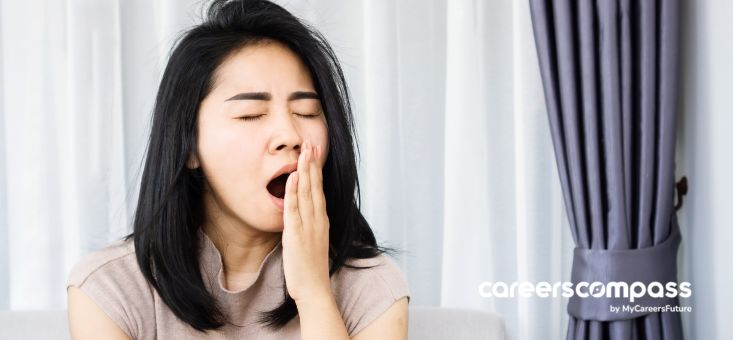Yes, it’s true; a significant number of workers who have had to return back to the office after the Covid-19 pandemic are showing signs of either exhaustion, detachment, or a reduced sense of efficiency.
Part of this has also led to certain trends arising in recent months, such as the notion of “Quiet Quitting”, which describes employees that still attend their job each day, yet only put in the bare minimum effort to complete their tasks.
But one under-looked factor for the workplace blahs is perhaps our change in diets after returning to the office.
According to research from Skynova, a company that provides invoicing software for small businesses, those who worked from home during the pandemic tended to make lunch for themselves instead of going out to eat.
Nearly half said they made lunch at home while working remotely, followed by delivery (42%), and 12% said they skipped lunch when working from home (we wouldn’t recommend that, though!).
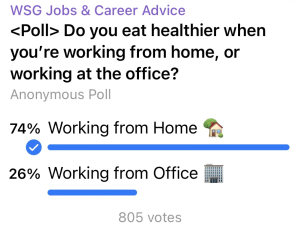
And it says a lot that a poll, run on our own Telegram channel, showed that 74% of local workers admitted to eating healthier meals when working from home, compared to when they’re back to the office.
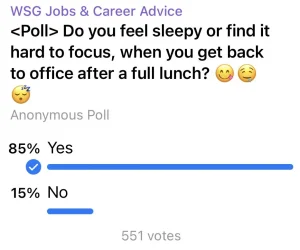
And of course, that affects our work productivity. 85% of local workers admitted as much in another poll we ran, revealing that they had the dreaded food comas when they returned to their work desks after a full lunch.
Here’s a closer look at Singaporean workers’ favourite lunchtime makan choices, and how they affect your energy levels and diet after.
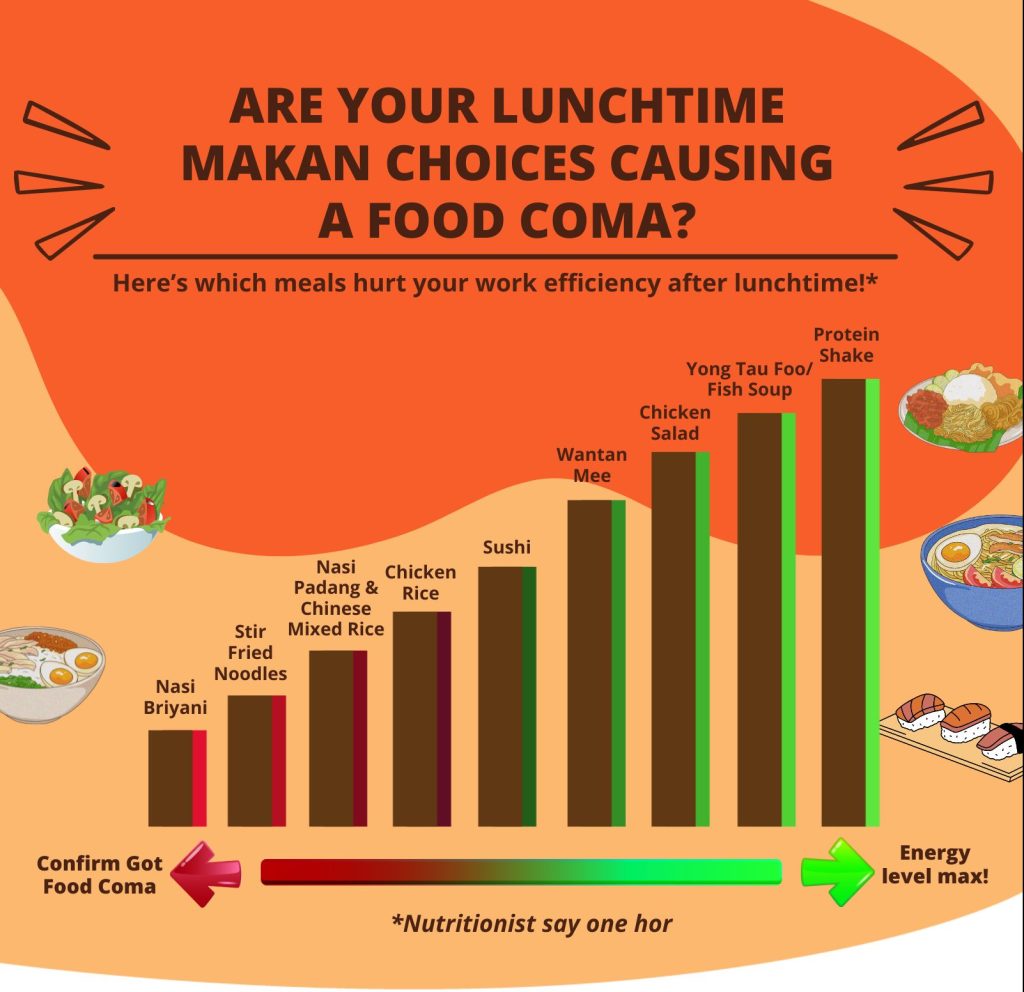
Will soupy meals or yong tau foo make you sleepy after lunch?
32% of our readers polled this as their favourite lunchtime meal, and good for them1 They are generally a default dish for folks watching their diet and trying to stay away from their carbs, but of course, what you pick is going to be key here.
As Jaclyn Reutens, founder and dietitian at Aptima Nutrition & Sports Consultants, suggests, select two or three leafy vegetables (eg. xiao bai chye, cabbage, dou miao or kang kong), two pieces of tofu (the white ones, not the fried ones), and two other items, ideally the non-deep-fried ones such as eggs, tomatoes, brinjals or ladies fingers.
She added: “If you really would like a fried item, just take one only. Try to skip the highly processed foods such as crab sticks and fish balls, as they do not have much nutritional value.”
If you must get carbs, bee hoon over rice and kway teow, for sure. The former weighs in at 192 calories per servicing, while the latter at 280 calories.
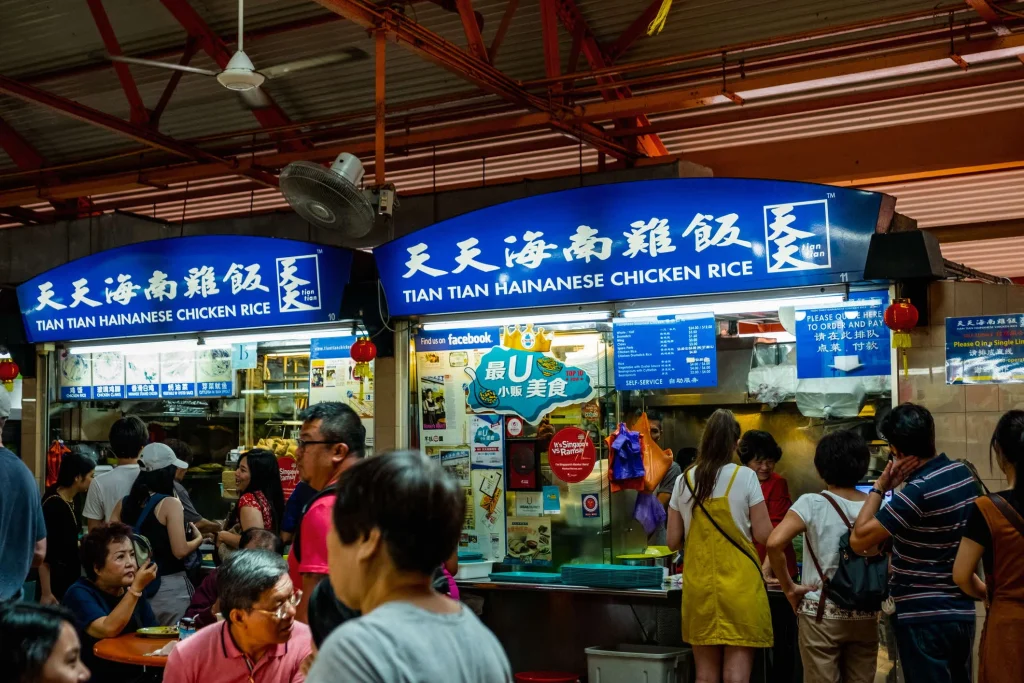
Will fried and carbohydrate-based meals make you sleepy after lunch?
Now here’s where we discovered why 85% were having food comas after lunch – the majority of votes for favourite lunch-time choices included stir-fried noodles such as mee goreng, Hokkien prawn mee, char kway teow, or rice dishes such as chicken rice, nasi padang and Chinese mixed rice!
It’s not a mystery why so many are sleepy then, as fried food and those rich in carbohydrates can make you feel sluggish due to the high-fat nature of the meal, which requires a bit more time to digest.
This results in your body spending more energy on digestion, leaving you feeling low in energy, according to medical researchers.
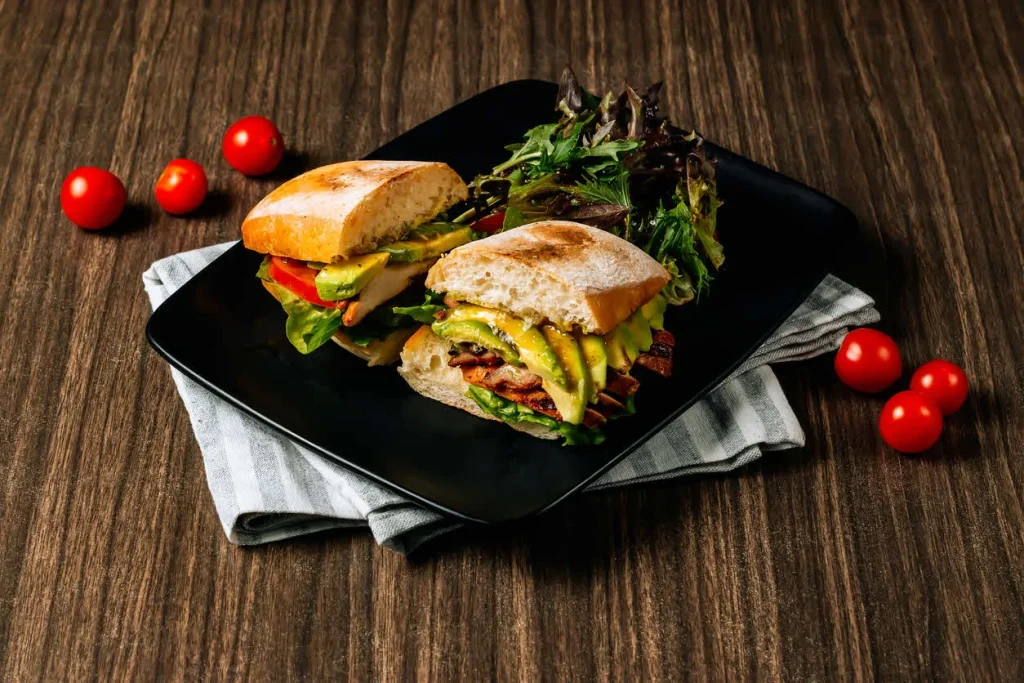
Will salads, sandwiches, or sashimi make you sleepy after lunch?
So, that 15% who aren’t feeling brain fogged after lunch? They’re probably the ones who voted for the above as their favourite meal options. Fruits and nuts are natural brain boosters, and eating smaller meals instead of a big lunch can also reduce tiredness, research says.
How’s all this going to hurt your career aspirations? A study of nearly 20,000 employees who worked at three large companies in the United States showed that those who have poor dietary habits were 66% more likely to report productivity loss, fatigue, and decreased mental effectiveness compared to co-workers who ate whole grains, fruits and vegetables.
And just a shoutout to the lonely 4% who picked protein shakes after a lunchtime workout… you might be on to something. Staying hydrated is key to avoiding feeling fatigued at work as well.
That’s not to say you should skip your lunch break!
On the other hand, let’s make it clear, we’re not telling you to skip that meal either – just to be wary of the effects your food choices have.
The fact is while many workers do work from lunch, studies have shown the importance for employees to take a proper full lunchtime break away from their desks.
In fact, these reports showed that 90% of workers feel refreshed and ready to get back to work after a proper lunch break, with benefits including mental health boosts and increased creativity.
Ultimately, the trick is to find the right balance between protein, carbohydrates and fibre in your meals- this will make all the difference in avoiding the dreaded food comas!


